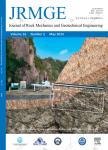Evaluation of the mechanical degradation of carbonate aggregate by rock strength tests
Evaluation of the mechanical degradation of carbonate aggregate by rock strength tests作者机构:Department of Ceology University of Isfahan
出 版 物:《Journal of Rock Mechanics and Geotechnical Engineering》 (岩石力学与岩土工程学报(英文版))
年 卷 期:2019年第11卷第1期
页 面:121-134页
核心收录:
学科分类:07[理学]
主 题:Aggregate degradation Unconfined compressive strength Point load index Carbonate aggregates
摘 要:Aggregate degradation(AD) is one of the major reasons accounting for failure of aggregate materials, and the mechanical degradation of aggregate materials can be determined by different test methods. This process basically requires many aggregate samples and special instruments, and thus is *** main purpose of this research is to evaluate the possibility of estimating the AD characteristics using rock strength tests and to investigate the relationships between AD properties and rock strength *** understanding the relationships, two common rock strength tests are employed, i.e. unconfined compressive strength(UCS) and point load index(PLI) tests. In the tests, the AD properties of 40 kinds of carbonate aggregates sampled from Iran were studied. The AD properties were determined by Los Angeles abrasion value(LAAV), aggregate impact value(AIV) and aggregate crushing value(ACV). Also,the samples are classified according to the strength and rock types, and the effect of this classification is investigated based on the relationship between rock strengths and AD properties. The results indicate that the PLI is better than UCS for evaluation of AD properties. Among rock strength tests, PLI has a closer relationship with AIV(R^2 = 0.832). Also, UCS has relative larger effects on the ACV(R^2 = 0.812) under the same loading condition. The weakest correlation occurs between LAAV and UCS(R^2 = 0.679). In view of the rational AD properties in the predictive procedure, it is possible to predict AD properties based on the strength tests and rock types. The results also show that the prediction of AD properties using rock strength test based on rock types yields better correlations than that using unclassified samples. The classification based on rock types can extrapolate the different relationships of AD prediction from rock strength tests. The results in this context could be used for preliminarily selecting proper rock aggregates with a limit of allowable AD



